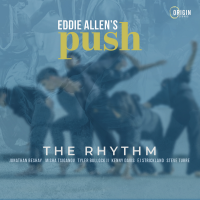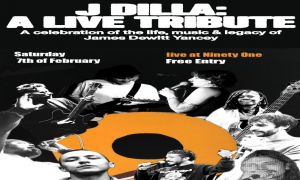
Saxophonist Fred Anderson passed away Thursday, June 24, leaving a hole in the Chicago and international avant-garde jazz scenes that will never be truly filled. The cause of death has not been given, but Anderson had suffered a heart attack on June 14 while in the hospital with complaints of stomach pains. He was 81.
I first came across Anderson's music in 1997 when saxophonist Ken Vandermark hipped me to his stuff. One of the first things I got is a date Anderson did with DKV (Hamid Drake on drums, Kent Kessler on bass and Vandermark on reeds), and it's an album that I still cherish a great deal. Over the years, I've gone back to the ballad 'Black Woman' from that album countless times and even have the album on my iPod, which for me is truly a yardstick that separates stuff I like from stuff I love.
Soon thereafter, I met Anderson during his yearly jaunts out to the Vision Festival in New York. He appeared frail and stood sort of hunched over. He had a quiet and kind voice and a penchant for suspenders and work clothes--nothing about him screamed “music icon" until he put his horn to his lips. Then the planets aligned and you realized that his music was a gift that made the world a better place.
Strapping on his tenor to play with William Parker, Hamid Drake and Kidd Jordan was a regular event of the Vision Festival and a personal musical highlight. I remember one time watching him sit there in a chair waiting his turn to play, clutching his saxophone as if he were holding a baby. Musicians and fans would come up and speak to him as if they were talking to their grandfather, putting their hand on his shoulder or giving him a hug. Fred was the mountain and people came to him.
Then he'd shuffle up onstage, get his bearings and, with nod to his players, he was off and running. His sound was big and robust, and it seemed totally at odds with the frailty of the man. I remember one set where he charged out of the gate playing at a ferocious pace, working up and down his horn for a solid 15 minutes before taking a brief pause. One moment he'd be honking away on a cavernous low-end figure, the next he'd be squealing in the upper register with equal intensity. In between, he worked at a dazzling pace, nimble and fleet of finger from a steady ongoing practice schedule. Because of his advanced age, he grew up listening to Charlie Parker and other beboppers of the day, digesting their lessons, and you could hear that in his playing up to the end. You could also hear the blues, as well, which spoke of both his life in Chicago and his childhood in the South. He often played fully improvised sets, yet he also wrote some great songs, too.
Fred believed in moving the music forward and in 1965 joined with such like-minded musicians as Muhal Richard Abrams, Roscoe Mitchell, Anthony Braxton and others to form the Association for the Advancement of Creative Musicians, a collective that was both community oriented and artistic minded, providing support and gigs to players who wanted to create original works.
He also opened the Velvet Lounge on Chicago's South Side in 1982, providing a place for AACM members and other musicians to play. It was a funky little place that was eventually leveled to make way for a condo project, but Anderson opened a new Velvet around the corner thanks to a massive outpouring of support from musicians and fans from all over the world. Most days you could go there and see Fred behind the bar, just a regular working guy pouring drinks.
Fred Anderson's brilliant music will always be remembered, but he just might have had a bigger impact as an inspirational figure to generations of musicians. He was booked to play with young drummer Chad Taylor at this year's Vision Fest, and he could often be found playing with younger players at the Velvet. He's mentored young-ish stars like Hamid Drake, Nicole Mitchell, Ken Vandermark, Jeff Parker and countless others, some of whom will likely be heard outside Chicago in the years to come. This is to say nothing of all the fans who came to hear him play and were inspired and moved by his music and his example.
I didn't know him well, but I have fond memories of talking to him on a few occasions. I was even lucky enough to share one magical lunch with him some years back as we did an interview. He refused to let me pick up the check that day, and who was I to argue? That lunch was a debt that I will now never be able to repay, but, really, that was an impossibility even before his death.
I first came across Anderson's music in 1997 when saxophonist Ken Vandermark hipped me to his stuff. One of the first things I got is a date Anderson did with DKV (Hamid Drake on drums, Kent Kessler on bass and Vandermark on reeds), and it's an album that I still cherish a great deal. Over the years, I've gone back to the ballad 'Black Woman' from that album countless times and even have the album on my iPod, which for me is truly a yardstick that separates stuff I like from stuff I love.
Soon thereafter, I met Anderson during his yearly jaunts out to the Vision Festival in New York. He appeared frail and stood sort of hunched over. He had a quiet and kind voice and a penchant for suspenders and work clothes--nothing about him screamed “music icon" until he put his horn to his lips. Then the planets aligned and you realized that his music was a gift that made the world a better place.
Strapping on his tenor to play with William Parker, Hamid Drake and Kidd Jordan was a regular event of the Vision Festival and a personal musical highlight. I remember one time watching him sit there in a chair waiting his turn to play, clutching his saxophone as if he were holding a baby. Musicians and fans would come up and speak to him as if they were talking to their grandfather, putting their hand on his shoulder or giving him a hug. Fred was the mountain and people came to him.
Then he'd shuffle up onstage, get his bearings and, with nod to his players, he was off and running. His sound was big and robust, and it seemed totally at odds with the frailty of the man. I remember one set where he charged out of the gate playing at a ferocious pace, working up and down his horn for a solid 15 minutes before taking a brief pause. One moment he'd be honking away on a cavernous low-end figure, the next he'd be squealing in the upper register with equal intensity. In between, he worked at a dazzling pace, nimble and fleet of finger from a steady ongoing practice schedule. Because of his advanced age, he grew up listening to Charlie Parker and other beboppers of the day, digesting their lessons, and you could hear that in his playing up to the end. You could also hear the blues, as well, which spoke of both his life in Chicago and his childhood in the South. He often played fully improvised sets, yet he also wrote some great songs, too.
Fred believed in moving the music forward and in 1965 joined with such like-minded musicians as Muhal Richard Abrams, Roscoe Mitchell, Anthony Braxton and others to form the Association for the Advancement of Creative Musicians, a collective that was both community oriented and artistic minded, providing support and gigs to players who wanted to create original works.
He also opened the Velvet Lounge on Chicago's South Side in 1982, providing a place for AACM members and other musicians to play. It was a funky little place that was eventually leveled to make way for a condo project, but Anderson opened a new Velvet around the corner thanks to a massive outpouring of support from musicians and fans from all over the world. Most days you could go there and see Fred behind the bar, just a regular working guy pouring drinks.
Fred Anderson's brilliant music will always be remembered, but he just might have had a bigger impact as an inspirational figure to generations of musicians. He was booked to play with young drummer Chad Taylor at this year's Vision Fest, and he could often be found playing with younger players at the Velvet. He's mentored young-ish stars like Hamid Drake, Nicole Mitchell, Ken Vandermark, Jeff Parker and countless others, some of whom will likely be heard outside Chicago in the years to come. This is to say nothing of all the fans who came to hear him play and were inspired and moved by his music and his example.
I didn't know him well, but I have fond memories of talking to him on a few occasions. I was even lucky enough to share one magical lunch with him some years back as we did an interview. He refused to let me pick up the check that day, and who was I to argue? That lunch was a debt that I will now never be able to repay, but, really, that was an impossibility even before his death.
For more information contact All About Jazz @ Spinner.




























